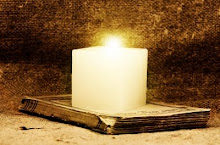
Magic Natural -
Magic is divided into two known branches: the one is infamous and composed of the spell of unclean spirits and orginates from a wicked curiosity which the wisest Greeks called Goetia or Theurgia and to which everything is hostile; like those who excite charms, ghosts or illusions of which suddenly there is no trace.
The other, by a similar asseration, is natural...This magic, which has and gives the contemplation of things which lie unapprehended and the quality, propriety, and knowledge of everything natural, to the peak of all philosophy.
It also teaches that with the help of others and by mutual and timely application, it carries out the works which the world esteems as miracles.
J.B. Parta, Natural Magic, Anvers, 1561, pg. 92
Magic pertaining to, used in, magic: possessing marvellous qualities or causing wonderful or startling results; by means of union with spirits.
Webster's Dictionary Banner Press, Pg. 296
Magic (from Persian priests), practice of manipulating course of nature by supernatural means. It is based on the belief that unseen forces which permeate all things populate the universe and that control of them gives man control over nature. Magic frequently combines within its scope elements religion. Its aim (using and changing nature) approximates that of science, an outgrowth of magic. The practice of magic is held to depend uopn the proper use of both ritual and spell. Amulets and imitative acts (e.g., fertility rights based on analogy between plant and human generation) are also used. Almost all ancient people believed in magic. Those who practiced black magic (malevolent) magic are called sorcerers and witches. Many present-day superstitions are remnants of pagan magic, and powers is still extant.
The Columbia - Viking Desk Encyclopedia Third Edition,Viking Press Pg. 648 (1953, 1960, 196, by Columbia University Press)
Magic is the art of effecting change through an external and supernormal force. Man's awareness of magic and his efforts to use it to enhance his place in his environment are ancient and universal and have been a part of all religious systems. The earliest evidence of magic dates from cave paintings of the Paleolithic Age, some of which suggest that magic rituals were emploed to secure sucessful hunts.
The Encyclopedia of Witches and Witchcraft Rosemary Ellen Guiley Pg. 213
The use of a certain ritual action to bring about the intervention of a supernatural force, either in human affairs or in the natural environment, for a specific purpose. Magic has existed universally since ancient times and varies in form from primary rituals involving the well-being of an entire community to minor, peripheral, private acts of magic. All forms of magic are traditionally secret arts taught only to initiates, although in some cultures magical knowledge can sometimes be bought and sold or can be passed on through inheritance. A distinction is usually made between Black Magic, used destructively to bring misfortune or death, and White Magic, which is used to ward off such attacks as well as to prevent natural calamities. In itself magic is not good or evil - it is the magician's intentions that makes the difference.
Geddes & Grosset Dictionary of the Occult copy right 1996















